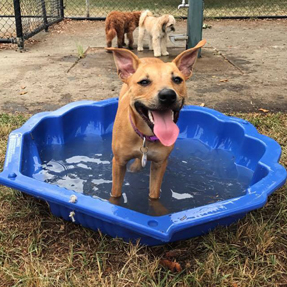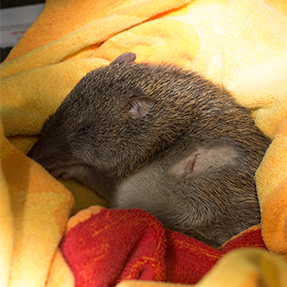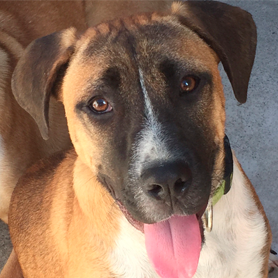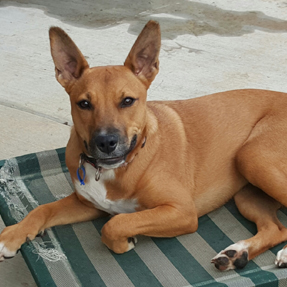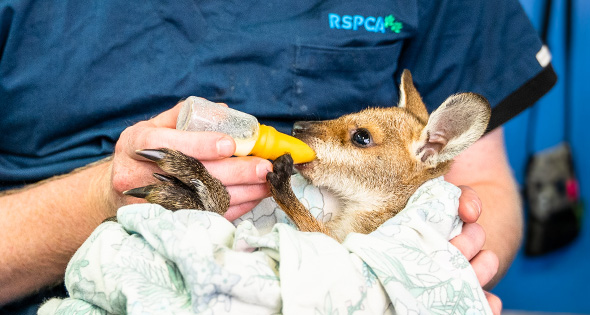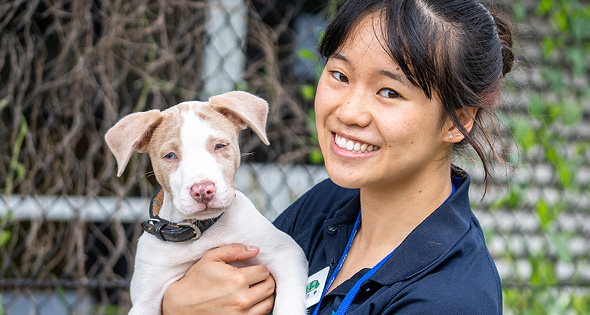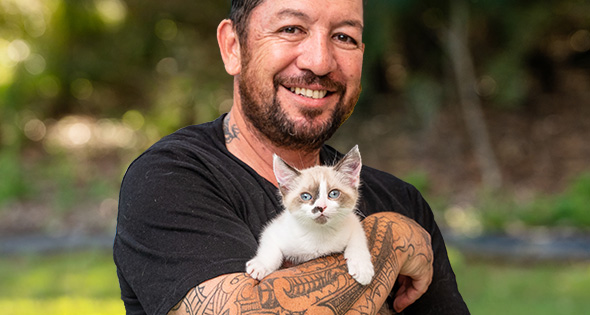A response to a recent Council animal seizure.
The work we do here at RSPCA is hard, but definitely rewarding. While those of us who are paid are grateful for our wages, none of us do it for the money.
Our work is challenging, our hours are long, we see the worst of humanity, and sometimes it's only our passion for animals and the support of the community that keeps us going. So it hurts us all when we see social media commentary about RSPCA that is misleading, especially when it's done with the intention of harming our reputation. Even more soul destroying is seeing people prepared to accept misinformation without checking its veracity. We all work hard for the animals, and work hard for your support.<
We know that sometimes you have questions and you want those questions answered. So why don’t we respond to these social media attacks with our story? What we see as the truth? Why don’t we sue for defamation?
Well defamation actions are costly, protracted and time consuming. Even if successful, any recovery of damages and costs is rare and the harm done cannot really ever be undone. People with money and property rarely risk being defamatory so it is rarely ever worth spending donor dollars conducting civil legal actions. The money they donate is to help animals, not punish mistruths and line lawyers’ pockets.
Here, we are speaking out to answer your questions as best we can and provide information to help educate your decisions on topical situations and campaigns. So please, if you have further questions, feel free to contact us directly.
RSPCA Qld's response to a recent council animal seizure concerning a dog called Bandit
Some of you may have seen a Facebook page and associated Change.org campaign regarding a dog called Bandit.
There are many things being said that are simply not true, and some of what is being said is done with the apparently deliberate intention of depriving RSPCA of valuable donations, and harming our reputation. Here are some facts about this case - and if you have other questions, please feel free to contact us directly.
Bandit Update: 2019 Queensland Civil and Administrative Tribunal Decision
Did RSPCA seize Bandit?
No. Bandit was seized by Scenic Rim Regional Council under their legislation pertaining to dangerous and menacing dogs. RSPCA does not enforce this legislation. It has nothing to do with animal welfare.
It is about protecting the community from the risk of dangerous dogs. So there is no question of whether or not the dog was 'at fault' or whether the dog's actions were 'justified'. The only question really is whether the dog poses a risk to the safety of people in the community, including the dog’s owners.
But that is a decision for Councils to make, and there is a very accessible legal process available in QCAT whereby dog owners can review and appeal decisions made about their dogs.
We are told that Bandit was seized after three unrelated attacks on three separate people – in April, June and September 2017 - all of which took place outside of Bandit's property – two on the footpath or road and one on the neighbour’s property.
We do not know these facts first hand. They are of course facts that Bandit's owner has a right to dispute, and Council has an obligation to prove. But ultimately, the laws are in place to protect people, including dog owners and children, from dangerous dogs, so these allegations are taken seriously by Council.
What about allegations of cruelty to Bandit?
The conditions Bandit was being kept in at Scenic Rim Regional Council pound were investigated by RSPCA Inspectors. The Inspectors observed that Bandit was extremely aggressive – and unable to be approached, handled or walked.
The facilities were considered to be adequate for holding dogs in the short term but our Inspector provided some advice to Council about improving the facility for aggressive dogs held on a long term basis. Due to the risks involved, aggressive dogs cannot be exercised by Council staff, so when they are held long term, their needs for enrichment need to be met in other ways.
Our advice included screening the dog off from stimulants, increasing the kennel size, and providing various kinds of enrichment in different ways during the day.
Council staff implemented most of these suggestions immediately, but in order to finalise their renovations and increase the kennel size, Moreton Bay Regional Council agreed to take Bandit into the Dakabin pound facility for up to two weeks.
This facility is operated by RSPCA Qld as contractors. This means that the RSPCA has responsibility for the daily care of dogs in the pound, but does not have any power to hold or release animals other than as directed by Council.
During Bandit’s stay at the Dakabin facility, his owner and family visited him, spent time with him, and exercised him. They were very happy with Bandit’s conditions at the facility and were grateful to staff for the care provided.
However they did not comply with visitation rules, which are put in place to comply with the law, and to protect dogs, staff, owners and the general public. During the last visit, Bandit’s adult owners conducted a tirade of abuse against staff members, swearing and yelling at them for an extended time, in the presence of children and the general public.
Following this incident (with the safety and wellbeing of staff, members of the public and Bandit in mind), Bandit’s owner was advised that visits could no longer continue. By that time, the renovations at Scenic Rim had seen improvements in the facility, including Bandit’s kennel size, and Bandit was returned to that facility.
Further complaints about this facility were made by Bandit’s owner to the RSPCA. Due to the need to avoid any perceived conflict of interests, RSPCA had to forward these complaints to inspectors at Biosecurity Queensland, at Department of Agriculture and Fisheries, who also investigate complaints under the Animal Care and Protection Act 2001.
Bandit’s owner was advised that his complaints were forwarded, and he began liaising with DAF about his concerns. DAF finalised their investigation, which included an independent veterinary assessment of Bandit and his living conditions, and found no concerns that warranted further action. Bandit’s owner was advised of this outcome.
What about the allegations about RSPCA Qld CEO Mark Townend?
Our CEO Mark Townend is tireless in his dedication to animals and RSPCA, and has been for the 17 years he has been involved at RSPCA.
Sadly the unfounded and malicious allegations made about him by Bandit’s owner are not only unlawful, but extremely upsetting for him and his family and friends.
Mark has not been sacked and he has never committed animal cruelty. He did not send Bandit back to the Scenic Rim Regional Council pound because he was upset about Facebook posts and his affidavit does not say that. They are simply untruths.
As a responsible employer, RSPCA Qld has a duty to protect staff from exposure to this kind of stress and harm, and to protect the animals involved as well. Mark Townend takes this duty seriously. He values his staff, because he values the work they do for the animals.
Was Bandit’s owner successful in Court?
No. Bandit’s owner was entirely unsuccessful in his recent application to the Court, and costs were ordered against him on an indemnity basis. The Judge’s comments made it clear that Bandit’s owner had been completely and utterly unsuccessful.
Bandit’s owner refers to being successful in having the destruction order stayed. While this had nothing to do with RSPCA, this is not correctly characterised as a success. This was not an order made by the Court.
The Council lawyers simply gave an undertaking, voluntarily and before court commenced, that they would not take steps to euthanase Bandit until the outcome of his owner’s application to QCAT for a stay of the decision to euthanase Bandit.
Every other animal owner in this situation is given this same benefit. It is not a decision or concession that is made based on any facts about the dog or Bandit’s owner or the case. It is simply Council affording fairness and natural justice to Bandit’s owner.
Can RSPCA stop the destruction order?
In short, no. Under the Animal Care and Protection Act 2001, which RSPCA Inspectors enforce, killing is only cruel if it is done inhumanely and is not otherwise excused by law.
When dogs are euthanased by Council, it is done humanely, using the same methods as vets use to put our beloved pets to sleep. It is a lethal injection which is painless and fast, and the dog goes to sleep.
The sad reality is that animal rights co-exist with human rights – and when animals represent an unacceptable danger to people, regardless of whether it is their fault or not, it is usually the animal’s rights that give way to human rights.
This is particularly the case with domestic pets – and is the very reason why we always encourage and assist people to care responsibly for their animals so that they can be a part of our community without posing a risk to people in the community.
How can I sort fact from fiction so I can make up my mind about this?
The reality is that it will be hard for the public to come to an accurate conclusion about Bandit’s matter because, for the most part, all the information and knowledge, together with the experience and expertise required in order to reach an accurate conclusion is simply not available to the general community.
This is because much information is privileged, protected by privacy laws or legalities, or is simply, to put it bluntly, none of their business – because they are not the decision makers in this matter.
The decisions are being made by people who have legal and decision making training, and experience and expertise in these kinds of matters, and by people who have all the facts and knowledge required to make the decision.
There are many factors that are taken into consideration by decision makers in relation to dangerous dogs, in addition to animal welfare and how the decision will impact on the owners.
We at RSPCA are not privy to all that information and are not experts in making these decisions, and the public even less so.
This matter is being aired and heard in a court of law, in QCAT. It is not on trial before the public. The only reason it is in the public arena is because Bandit’s owner chose that path. However whether Bandit is returned to his owner or not is a question that will be decided by the court, and the courts are not influenced by social media campaigns or community pressure.
People power could probably best be directed at any changes to the laws concerning dangerous dogs which might benefit dogs and owners during this process.
We realise that sometimes it can be frustrating that the RSPCA cannot do more or tell you more. But we are constrained by laws and protocols. Non-compliance could mean we lose our ability to work for the animals, and this would have a devastating impact on animal welfare.
What can you do?
We are asking you not to be a silent majority.
SEEK THE TRUTH Ask us about cases you may have come across, and where we can elaborate within privacy laws, we will. When you see negative commentary about RSPCA please think things through. Don’t give up on us so easily. Write to us. Call us. But please don't be so quick to believe the worst about us without questioning what you have read or heard. Defend the RSPCA and the animals they help. Nobody is perfect. We make mistakes. We have made mistakes. But we also pride ourselves on being able to improve and change. But any person who suggests we would be deliberately cruel or neglectful or that animal welfare is not paramount to us, is totally wrong.
THINK BEFORE STOPPING DONATIONS We encounter many people who say they are animal lovers and supporters, but then withdraw donations on the basis that they have heard something negative about the RSPCA. This does not make sense to us. Your donations are for the animals. Withdrawing donations punishes animals – not the RSPCA. Withdrawing donations does not achieve anything. If you want change, if you want things to improve, if you have a criticism or concern, then please feel free to contact us about that. There are many ways that improvement and change and resolution can be achieved without denying animals the care they need, and the care that the RSPCA provide, each and every day.
HELP SPREAD THE WORD Help spread the word about the RSPCA in a positive manner. We have so many stories to share!

